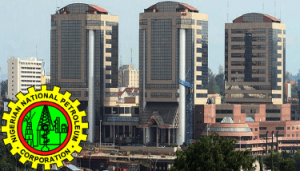Without Due Process, NNPC Recruited More Staff Despite Losses, Personnel Earn More Than Nigerian President
The 2018 audited financial statements of the Nigerian National Petroleum Corporation (NNPC) has confirmed DATAPHYTE’s report on the salary of its personnel.
The financial statements released on Monday, June 15th, showed salary structure, range, and benefits of low and high ranking personnel at the state-owned oil firm. It also reveals the staff strength of workers at the NNPC in 2018.
The NNPC published report includes audited accounts of its 20 subsidiaries and business divisions for the financial year 2018. However, it did not reveal the overall group’s performance.
According to the financial statement of NNPC Retail, employes received above ₦1 million and up to ₦4.5 million. For instance, 32 out of 233 Personnel received above ₦4.5 million each as take-home pay per annum. It excludes pension contributions and other benefits. The breakdown of the figure showed that the total staff salary expenses of the subsidiary worth billions of Naira per annum.

Thanks This confirmed data analysis conducted by Dataphyte on the staff salaries of DPR in May.
The analysis from daily payment data published on the Open Treasury Portal indicated that the subsidiary paid over ₦8 billion as salary upfront in January 2020.
The review of salary payments showed 29 top officials received between ₦50 million and ₦71.7 million as upfront salary payment. Another 30 received between ₦30 million and ₦49.9 million. 51 staff members received between ₦20 million and ₦29.9 million. 119 others received between ₦10 million and ₦19.9 million. The remaining 375 staff members received between ₦5 million and ₦9.9 million.
Breakdown of 2018 Salary of NNPC Personnel
According to the financial statement of NNPC Retail, employees received almost ₦1 billion as emoluments. Apart from the 32 personnel, five (5) staff also received up to ₦1.5 million. Also, 26 received up to ₦2.5 million, 81 got up to ₦3.5 million, and 89 employees got up to ₦4.5 million, respectively.
The financial statement showed directors’ remunerations were not recorded for the Retail outlet while emoluments of Executive Directors were paid but not disclosed. In another instance, the non-functional Kaduna Refinery paid four (4) directors up to ₦20 million. One (1) director received more than ₦25 million. Analysis of each directors’ emoluments at ₦1.6 million each per month is high than President Muhammadu Buhari’s basic monthly salary at ₦292,892.
Civil Society reiterates call for the privatisation of NNPC to be commercially viable
This lopsided salary structure raises questions on revenue management. Faulty recruitment process adopted NNPC formed another discussion. Apart from the opaque process, it also violated the nation’s quota system. The leaders of the Oil Producing Areas have described the process as an insult on the region.
Atiku Samuel, a policy analyst, queried sharp jump in staff strength. The non-functional Kaduna refinery is one of such during the period.
“One key thing is that there is a sharp jump in the salary of staff with no public recruitment. It raised questions around transparency and why we need to talk about the sector. Also, it shows NNPC has been recruiting against principles that made up Nigeria,” he said.
The Treasury Data also raises questions about whether salary structure discrepancies violated the rules of the National Salary, Incomes, and Wages Commission.
“NNPC needs to provide more information on its operations. Most especially on its staff strength and recruitment processes,” Patrick Okigbo, a public policy analyst, said.
Ms. Tengi George-Ikoli, Program Coordinator at Nigeria Natural Resource Charter (NNRC) says national owned companies must run viable entities.
“The NNRC’s benchmark argues that govt-owned companies must be ‘accountable with well-defined mandates to run efficiently’.
“Reporting consistent losses while still hiring does not appear commercially efficient. Where losses are incurred consistently, the commercially efficient response is a staff freeze or downsizing.”
She commended NNPC for following the 2007 Fiscal Responsibility Act on audited reports.
“We expect NNPC to share previous audited reports. They should also share those of its HQ, its 2019 audited reports for the subsidiaries and HQ. “We would then expect stakeholders to interrogate the reports and make NNPC more accountable.”
Ms. Ronke Onadeko, an energy expert, said the refineries have had a huge cost of government.
“The refineries have become cost centres for the government. Heavy on human capital, their benefits, and retirement packages. “Also heavy on maintenance and wasteful on resources. The value of the output products erodes the value of the raw crude not to talk of other costs.
“For these reasons, the expedient thing to do is to retrench, redeploy, or re-skill the refinery staffers for the inevitable transition to privatisation or job losses. Nigeria shouldn’t bear the burden of non-value adding human resource“
Ms. Onadeko urged the government to query the Civil Service Commission for recruitment without due process and exit such personnel from the government payroll.



